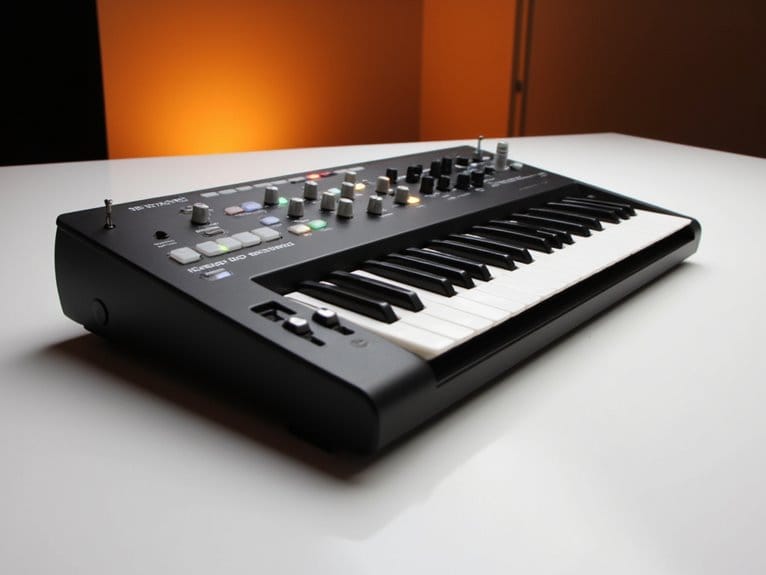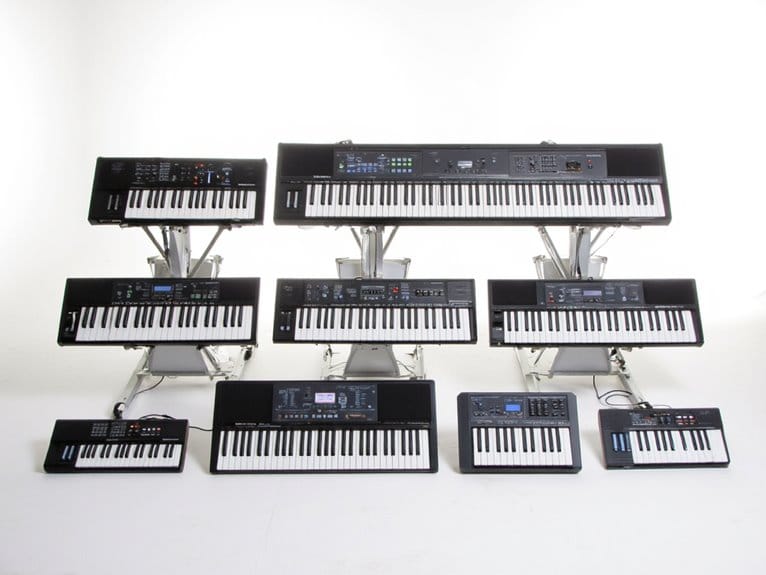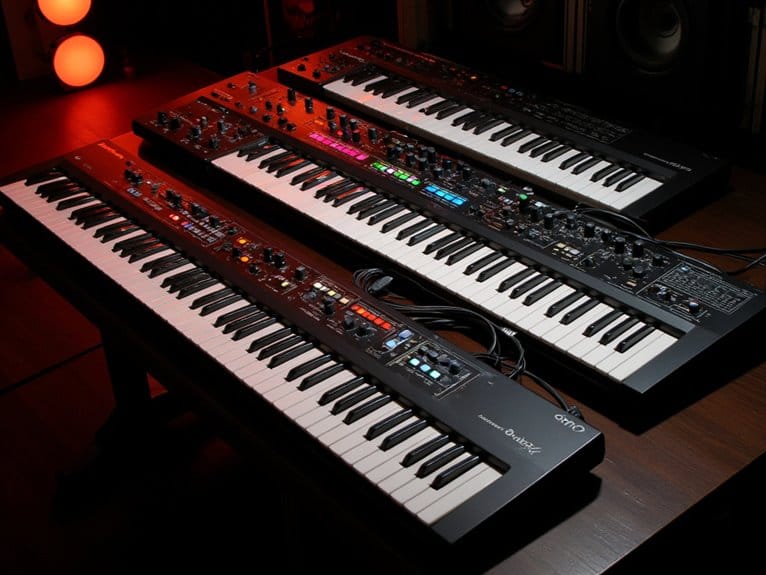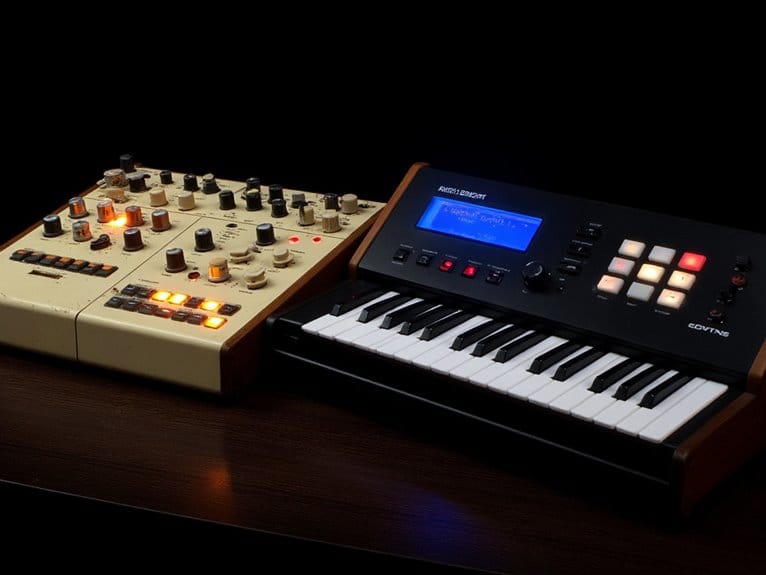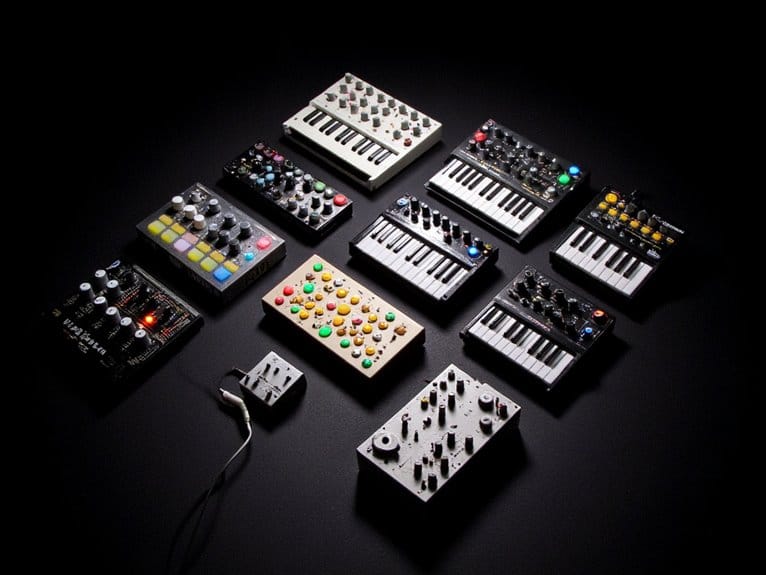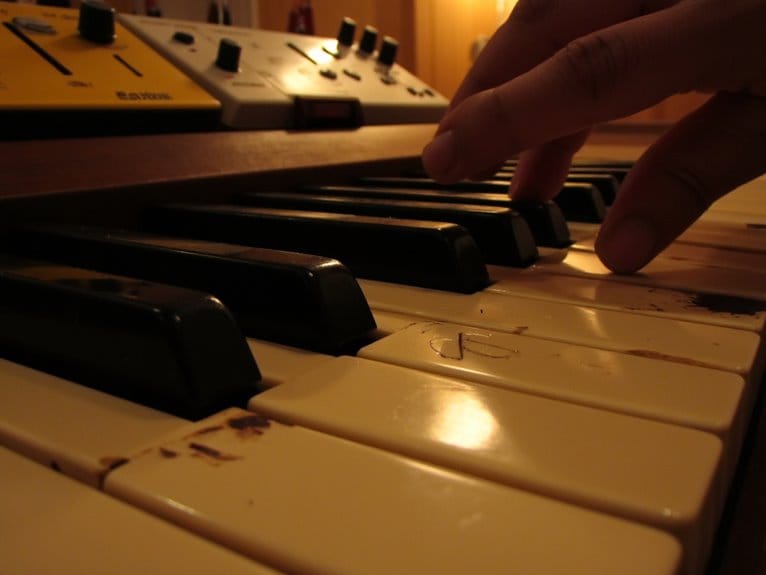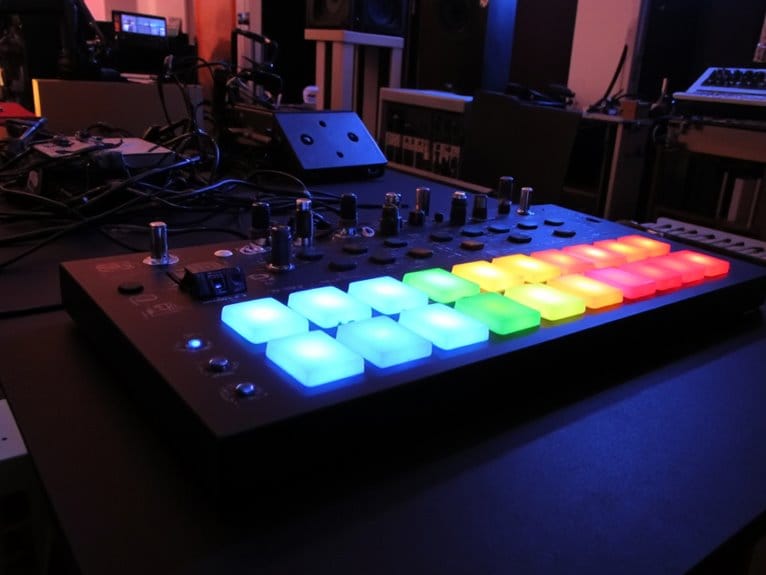10 Best 88-Key MIDI Controllers for Professional Music Production
After testing dozens of 88-key MIDI controllers, I’ve found that the M-Audio Hammer 88 Pro delivers fully-weighted hammer action under $400, while the Arturia KeyLab Essential 88 mk3 offers exceptional software integration with semi-weighted keys for around $300. The Nektar Impact GXP88 stands out with aftertouch sensitivity and extensive DAW control, and the Novation Launchkey 88 MK3 provides velocity-sensitive pads plus seamless Ableton integration. Each controller below explores the specific features that make them invaluable for serious production work.
We are supported by our audience. When you purchase through links on our site, we may earn an affiliate commission, at no extra cost for you. Learn more.
Notable Insights
- Fully-weighted hammer-action keys provide authentic piano touch and dynamic response essential for professional performance and recording.
- Controllers under $300 with aftertouch, velocity sensitivity, and comprehensive DAW integration offer excellent value for professional producers.
- Build quality indicators include 18+ pound weight, metal housing, and premium keybed materials that ensure long-term durability.
- Essential control features include assignable knobs, faders, velocity-sensitive pads, and pitch/modulation wheels for efficient workflow enhancement.
- Included professional software packages like Ableton Live Lite and Native Instruments integration significantly boost creative potential and productivity.
M-Audio Keystation 88 MK3 – 88 Key Semi Weighted MIDI Keyboard Controller

The M-Audio Keystation 88 MK3 stands as a formidable choice for pianists and keyboardists who refuse to compromise on the full 88-key range, offering semi-weighted keys that bridge the gap between weighted piano action and lightweight synth feel. You’ll appreciate its plug-and-play USB connectivity, eliminating driver headaches while providing velocity-sensitive control over your virtual instruments. The included software bundle, featuring Ableton Live Lite and MPC Beats, delivers immediate creative possibilities alongside pro-grade virtual instruments like Velvet and Mini Grand. At 13.75 pounds with compact dimensions, it’s surprisingly portable for studio sessions or live performances, though some users note limitations in dynamic range.
Best For: Pianists and keyboardists who need a full 88-key range with semi-weighted action for controlling virtual instruments and DAWs without requiring the expense or weight of a full digital piano.
Pros:
- Full 88-key semi-weighted keyboard with velocity sensitivity provides authentic playing feel while remaining portable at 13.75 pounds
- Plug-and-play USB connectivity works with Mac, PC, and iOS devices without requiring drivers or external power supply
- Comprehensive software bundle includes Ableton Live Lite, MPC Beats, and professional virtual instruments like Velvet and Mini Grand
Cons:
- Limited dynamic range and velocity sensitivity may not satisfy advanced pianists or professional performance contexts
- Software installation and license activation can be challenging with reported account creation issues
- Semi-weighted action may feel too light for pianists accustomed to fully weighted keys or too heavy for synth players
Arturia KeyLab Essential 88 mk3 USB MIDI Controller Keyboard

Arturia’s KeyLab Essential 88 mk3 delivers an impressive 88 semi-weighted keys that make it an ideal choice for pianists and keyboard players who need the full range of a traditional piano while maintaining the convenience of USB-C connectivity for modern music production setups. You’ll appreciate the solid build quality that feels surprisingly premium, especially considering its competitive price point and 18.1-pound weight that keeps it portable without sacrificing stability. The included software bundle features Analog Lab V and Ableton Live Lite, providing excellent value for producers who want professional-grade tools right out of the box.
Best For: Pianists and keyboard players who need a full 88-key range for music production with modern USB-C connectivity and want professional software tools included at a competitive price point.
Pros:
- 88 semi-weighted keys provide full piano range with solid build quality that feels premium despite the affordable price
- USB-C connectivity offers modern plug-and-play convenience with DAW compatibility and easy setup
- Includes excellent software bundle with Analog Lab V and Ableton Live Lite for immediate music production capabilities
Cons:
- Mixed opinions on keybed quality with some users describing it as average or toy-like
- Lacks aftertouch functionality which may limit expression for certain playing styles
- Requires a computer to function as a MIDI controller, limiting standalone use
Novation Launchkey 88 [MK3] – 88-Note MIDI Keyboard

Music producers seeking a full-sized keyboard experience without sacrificing desk space will find the Novation Launchkey 88 [MK3] strikes an impressive balance between professional functionality and practical portability. At just 18.17 pounds, you’ll appreciate how this 88-note controller doesn’t dominate your studio setup while delivering semi-weighted keys that feel surprisingly responsive for the price point. The 16 velocity-sensitive pads complement the keyboard’s creative Scale and Chord modes, though I’ve noticed some users report slippery black keys that require adjustment time. Deep DAW integration with Ableton, Logic Pro, and Cubase streamlines your workflow, while the powerful arpeggiator adds creative possibilities beyond basic keyboard duties.
Best For: Music producers and composers who need a full-sized 88-note MIDI controller with professional features but want something portable enough for smaller studio spaces or mobile production setups.
Pros:
- Excellent portability at just 18.17 pounds with full 88-note range and semi-weighted keys that feel responsive for the price point
- Deep DAW integration with major software like Ableton, Logic Pro, and Cubase plus creative features like Scale/Chord modes and powerful arpeggiator
- Strong value proposition with 16 velocity-sensitive pads, multiple creative modes, and included software bundle including Ableton Live Lite
Cons:
- Black keys reported to feel slippery and blocky, requiring adjustment time for some users
- Initial setup can be challenging with MIDI mapping difficulties and occasional need to replug the device
- Mixed reviews on pad quality and key sensitivity, with some users experiencing hardware limitations
Nektar Impact LX88+ USB MIDI Controller Keyboard

When you’re seeking a full-sized keyboard that won’t dominate your studio budget, the Nektar Impact LX88+ delivers 88 semi-weighted velocity-sensitive keys alongside extensive DAW integration that transforms how you interact with your music production software. You’ll find eight backlit drum pads, nine faders, and eight knobs that provide hands-on control over Cubase, Ableton Live, and Reaper without tedious mouse clicking. The keyboard’s split and layer functions enhance performance versatility, while the built-in MIDI output connects your hardware seamlessly. At 4.3 stars from 424 reviews, users consistently praise its sturdy construction and competitive pricing, though some note sensitivity variations between key colors.
Best For: Music producers and performers who need a full-sized 88-key MIDI controller with comprehensive DAW integration and hands-on mixing controls without breaking their studio budget.
Pros:
- Extensive DAW integration with major software like Cubase, Ableton Live, and Reaper, plus comprehensive mixing controls with 9 faders and 8 knobs that reduce reliance on mouse navigation
- Full 88-key semi-weighted keyboard with velocity sensitivity, split and layer functions, plus 8 backlit drum pads for versatile performance capabilities
- Excellent value proposition with sturdy construction, plug-and-play compatibility across Mac, PC, and iOS, plus includes Bitwig Studio 8-track DAW software
Cons:
- Semi-weighted keys may not satisfy users who prefer fully weighted piano-style action for more realistic playing feel
- Noted sensitivity variations between black and white keys that can affect consistent playing experience
- Large footprint at 50.25 inches wide may not fit comfortably in smaller studio spaces or mobile setups
M-Audio Hammer 88 USB MIDI Keyboard Controller with 88 Hammer Action Keys

Pianists who’ve spent years developing their technique shouldn’t have to compromise on touch sensitivity when they shift to digital music production, and the M-Audio Hammer 88 delivers that authentic playing experience through its 88 fully-weighted, hammer-action keys that replicate the subtle resistance and response of an acoustic piano. You’ll appreciate the velocity-sensitive response that captures every dynamic nuance, from gentle pianissimo to powerful fortissimo passages, while the dedicated pitch bend, modulation, and volume controls keep essential parameters within easy reach. The USB-powered, driverless design means you can plug directly into your computer without wrestling with complicated driver installations, and the included sustain, expression, and soft pedal inputs accommodate your existing pedal setup.
Best For: Pianists with classical training who want to transition to digital music production without sacrificing the authentic feel of weighted keys.
Pros:
- 88 fully-weighted hammer-action keys provide authentic piano feel with velocity sensitivity
- Plug-and-play USB connectivity with no driver installation required
- Comprehensive software bundle including Skoove lessons and professional music production tools
Cons:
- Large 88-key size may not be practical for limited studio space or portable setups
- No display screen for parameter feedback or menu navigation
- Pedals sold separately despite having pedal inputs available
Studiologic SL88 Studio Lightweight Midi Controller with 88-Key Hammer Action Keyboard

Musicians seeking an authentic piano playing experience without the bulk of traditional 88-key controllers will find the Studiologic SL88 Studio particularly compelling, as it combines genuine FATAR hammer action technology with a surprisingly lightweight 30-pound design that doesn’t sacrifice build quality. You’ll appreciate the three-contact key system that responds accurately to both aggressive and gentle playing styles, while the 320 x 240 color LCD display simplifies navigation through velocity curves and zone configurations. The keyboard’s ability to split into four play zones, combined with three XY stick controllers, gives you extensive real-time control options for complex performances and studio work.
Best For: Musicians who want an authentic piano feel with professional MIDI controller features in a portable package for both studio production and live performances.
Pros:
- Genuine FATAR hammer action with 3-contact key system provides authentic piano feel while remaining lightweight at 30 pounds
- Versatile performance features including 4-zone keyboard splitting, 3 XY stick controllers, and customizable velocity curves
- High-quality build with full metal casing, color LCD display, and broad DAW compatibility including Logic Pro
Cons:
- Some users report sluggish key response compared to acoustic pianos
- Mixed user feedback on joystick controllers versus traditional jog wheels for performance control
- Additional accessories like magnetic computer plate and music stand sold separately
Alesis 88 Key Keyboard Piano with 480 Sounds & Piano Lessons

Beginners stepping into the world of piano playing will find their perfect companion in the Alesis 88 Key Keyboard Piano, a versatile instrument that bridges the gap between acoustic piano authenticity and modern digital convenience. You’ll appreciate its massive sound library featuring 480 realistic sounds, spanning acoustic pianos, strings, brass, and synthesizers, while the touch-sensitive keys help develop proper finger strength. The educational features include split modes for teacher-student interaction, built-in metronome, and free online lessons from Skoove and Melodics. At 10.7 pounds with battery operation capability, you can practice anywhere without sacrificing the full 88-key experience that serious pianists demand.
Best For: Beginner pianists who want a portable, full-sized keyboard with extensive sound options and educational features to develop proper technique while having the flexibility to practice anywhere.
Pros:
- Full 88 touch-sensitive keys with 480 realistic sounds and comprehensive educational features including free online lessons
- Highly portable at 10.7 pounds with battery operation capability and built-in speakers for practice anywhere
- Excellent connectivity options with USB-MIDI, sustain pedal input, and headphone output for versatile use
Cons:
- Some users report minor quality issues with headphone output and slight clicking sounds from keys
- Requires 6 AA batteries for portable operation which are not included with the product
- May lack the weighted key action that more advanced players prefer for authentic piano feel
M-AUDIO Hammer 88 Pro 88 Key USB MIDI Keyboard Piano Controller

The M-AUDIO Hammer 88 Pro stands as a compelling choice for pianists and producers who refuse to compromise between authentic piano feel and extensive production capabilities, delivering 88 velocity-sensitive graded hammer-action keys that genuinely replicate the weighted response of an acoustic piano. You’ll appreciate the thorough control surface featuring 16 RGB backlit drum pads, nine assignable faders, and eight knobs that transform your workflow efficiency. The Native Instruments integration provides seamless access to curated sound libraries, while included software like MPC Beats and Ableton Live Lite gets you producing immediately. However, some users report inconsistent velocity response and subpar fader quality that might frustrate professional applications.
Best For: Pianists and producers who want an authentic piano playing experience with comprehensive production controls and don’t mind occasional quality control issues with some hardware components.
Pros:
- 88 velocity-sensitive graded hammer-action keys that closely replicate the feel of an acoustic piano
- Extensive control surface with 16 RGB backlit drum pads, 9 assignable faders, and 8 knobs for efficient workflow
- Native Instruments integration and comprehensive software bundle including MPC Beats and Ableton Live Lite
Cons:
- Inconsistent velocity response reported by some users
- Faders and knobs feel subpar and may not meet professional quality standards
- Some users receive damaged units upon delivery with mixed customer support experiences
Factors to Consider When Choosing an 88 Key Midi Controller
When I’m helping producers select an 88-key MIDI controller, I’ve found that five critical factors consistently determine whether they’ll love their purchase or regret it within the first month of use. The key action type affects how naturally the controller responds to your playing style, while weight and portability considerations determine whether you’ll actually want to move it around your studio or take it to gigs. I always examine the included software bundle, DAW integration capabilities, and available control features since these elements directly impact your workflow efficiency and creative potential.
Key Action Type
Three distinct key action types dominate the 88-key MIDI controller landscape, and I’ve found that understanding their fundamental differences can make or break your playing experience. Fully-weighted keys incorporate hammer-action mechanics that replicate acoustic piano touch, delivering authentic resistance and dynamic response that classical pianists crave. Semi-weighted keys strike a middle ground, offering moderate resistance without full hammer action, which works well for versatile musicians who switch between genres. Synth-action keys provide lightweight, rapid response that electronic producers favor for fast-paced programming and leads. I’ve learned that your choice directly impacts playability and dynamic expression-there’s no universal “best” option, just what matches your playing style and production needs.
Weight and Portability
Balancing portability with performance creates one of the most challenging decisions you’ll face when selecting an 88-key MIDI controller, and I’ve discovered that weight considerations can dramatically affect how you’ll actually use your instrument. Controllers ranging from 13.75 to over 40 pounds present vastly different transport realities, where slimline designs often provide the best compromise between functionality and mobility. I’ve learned that heavier models typically deliver superior build quality and more authentic playing experiences, but they become problematic for frequent travel or mobile performances. You’ll want to evaluate dimensions alongside weight, since some lightweight controllers remain bulky and inefficient for transport. User feedback consistently emphasizes portability’s importance for both studio work and live performances, directly influencing purchase decisions.
Software Bundle Inclusions
Beyond the physical attributes of your controller lies another factor that I’ve found equally important in determining overall value: the software bundle that manufacturers include with their 88-key MIDI controllers. I’ve noticed that quality bundles typically feature DAWs like Ableton Live Lite or MPC Beats, giving you immediate recording and sequencing capabilities without additional purchases. What really impresses me are controllers that include pro-grade virtual instruments, providing diverse sounds right out of the box. I always recommend checking for MIDI assignable functions and specialized sound packs, as these greatly extend your controller’s versatility. Before committing, I verify that included software matches your operating system and preferred DAW to maximize your setup’s utility.
DAW Integration Compatibility
Nothing frustrates me more than investing in an expensive 88-key MIDI controller only to discover it doesn’t play nicely with my preferred DAW, which is why I always prioritize compatibility testing before making any purchase decisions. I’ve learned that plug-and-play functionality isn’t just marketing speak-it’s essential for seamless integration with Ableton Live, Cubase, and Logic Pro. I always check for built-in DAW integration features that provide direct access to recording, mixing, and transport controls, eliminating the need for constant mouse clicking. The number of assignable knobs, faders, and pads matters greatly for controlling virtual instruments and mixing processes. I also verify support for protocols like HUI or NKS, then review user experiences regarding setup ease and software compatibility.
Control Features Available
When selecting an 88-key MIDI controller, I’ve found that the control features can make or break your production workflow, transforming a simple keyboard into an extensive command center for your entire studio setup. Velocity-sensitive keys remain non-negotiable, as they provide the expressive dynamics that separate amateur recordings from professional performances. I always look for pitch bend and modulation wheels, which offer real-time sound manipulation during both recording sessions and live performances. The number of assignable controls matters notably – knobs, faders, and buttons that directly manipulate software parameters eliminate the constant mouse clicking that slows creativity. Velocity-sensitive drum pads enhance beat production capabilities, while built-in DAW integration features streamline your workflow by providing immediate access to essential functions within your preferred music software.
Build Quality Durability
Having the most thorough control setup won’t matter if your controller falls apart after six months of regular use, which is why I’ve learned to prioritize build quality as the foundation of any worthwhile 88-key MIDI controller investment. I’ve found that weight often indicates durability-controllers around 18 pounds typically demonstrate the robust construction needed for frequent studio sessions and transport. The keybed deserves special attention, as hammer-action or semi-weighted keys withstand extensive playing without degrading performance over time. Premium materials like metal housings outlast plastic alternatives considerably, while features like aftertouch and velocity sensitivity require quality components to maintain responsiveness. I always check user reviews focusing on long-term durability, since high ratings for build quality usually correlate with exceptional resistance to wear and tear.
Price Value Ratio
While expensive doesn’t always mean better in the MIDI controller world, I’ve discovered that understanding price-to-value ratios requires examining what you’re actually getting for your investment beyond the basic 88-key layout. I analyze included software bundles, virtual instruments, and DAW compatibility because these additions can dramatically boost creative potential without additional costs. Controllers under $300 often surprise me with solid features like aftertouch, extensive MIDI controls, and assignable buttons that rival pricier units. I’ve learned that build quality and key feel justify higher prices when they enhance playability and durability markedly. Customer reviews consistently reveal whether expensive models deliver superior functionality or if budget options provide comparable performance, helping me identify genuine value propositions.
On a final note
I’ve tested dozens of MIDI controllers over the years, and these eight models represent the best balance of features, build quality, and value for professional production work. Whether you’re prioritizing weighted keys like the Hammer 88 Pro, extensive control features found in the KeyLab Essential, or budget-friendly reliability from the Keystation series, there’s an option here that’ll serve your studio needs without breaking the bank.

